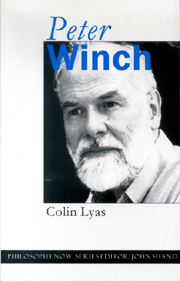Book contents
- Frontmatter
- Contents
- Preface
- Introduction: Peter Winch, a glimpse of a life
- 1 “Such understanding as I have”: The influence of Wittgenstein
- 2 “I was investigating the notion of the social”: The idea of a social science
- 3 “Seriously to study another way of life”: Understanding another society
- 4 “Good examples are indispensable”: The ethical life
- 5 “The concept of God is used”: The religious forms of life
- 6 “The interval of hesitation”: Peter Winch's Simone Weil
- 7 “Someone willing to die for truth”: Peter Winch's legacy
- Envoi
- References
- Index
5 - “The concept of God is used”: The religious forms of life
- Frontmatter
- Contents
- Preface
- Introduction: Peter Winch, a glimpse of a life
- 1 “Such understanding as I have”: The influence of Wittgenstein
- 2 “I was investigating the notion of the social”: The idea of a social science
- 3 “Seriously to study another way of life”: Understanding another society
- 4 “Good examples are indispensable”: The ethical life
- 5 “The concept of God is used”: The religious forms of life
- 6 “The interval of hesitation”: Peter Winch's Simone Weil
- 7 “Someone willing to die for truth”: Peter Winch's legacy
- Envoi
- References
- Index
Summary
I trust that if we next enquire where religion is chiefly to be sought among its fruits, only one answer will be found self-consistent and correct. The answer is, seek it where the vital contacts of man with the world are formed as feeling.
(Schliermacher 1969: p. 110)The condition of religion
Peter Winch's discussion of religion takes place against a background in which, most notably in secularized philosophy, religious belief is not taken seriously. In those quarters, it is widely believed, religion is a superstitious leftover. Like the Matthew Arnold of “Dover Beach”, all one hears now of the sea of faith, which was once “at the full”, is its “melancholy, long, withdrawing roar … down the vast edges drear/And naked shingles of the world”. It was in this context that Norman Malcolm expressed the sentiment, expressed, too, by Winch, that:
In our western academic philosophy, religious belief is commonly regarded as unreasonable and is viewed with condescension or even contempt. It is said that religion is a refuge for those who, because of weakness of intellect or character, are unable to confront the stern realities of the world. The objective, mature, strong attitude is to hold beliefs solely on the basis of the evidence.
(Malcolm 1993: p. 177)If the belief be that the sea of faith has receded, a refuge for the few who still hold out against a predominantly secular tide, that belief is simply false. Even were it true that, in large parts of England, religion had been reduced to scattered remnants of the old summoned by mellifluous bells to consolations of their evensong, that is not true in other parts of the world. Indeed in that world something like six billion people assert themselves to be religious, of whom some three billion attest to theism in some form or other.
- Type
- Chapter
- Information
- Peter Winch , pp. 129 - 154Publisher: Acumen PublishingPrint publication year: 1999



